Parliamentary election in Portugal, 10 March 2024
Marco Lisi
Marco Lisi is an Associate Professor at NOVA University LisbonIssue
Issue #5Auteurs
Marco Lisi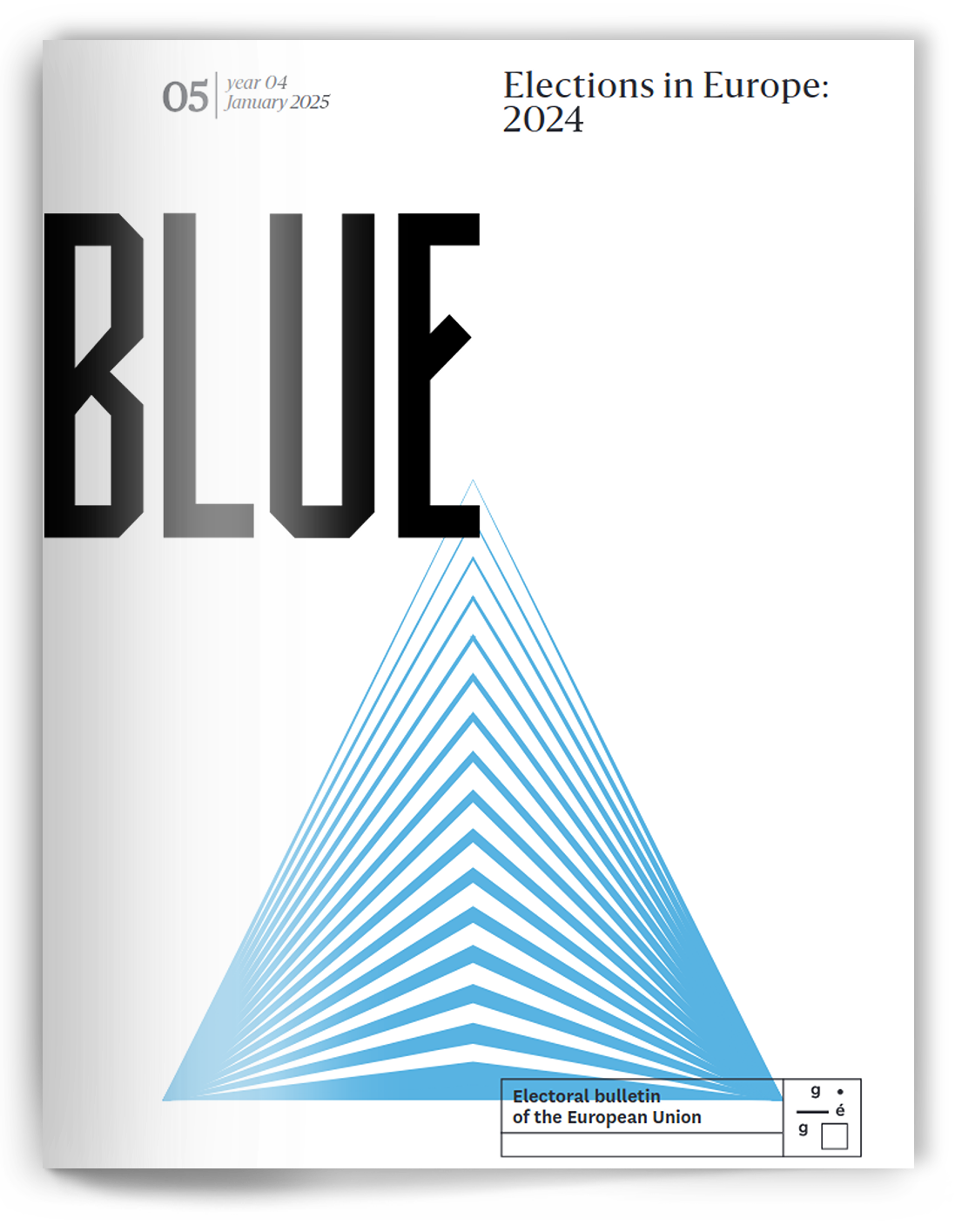
Issue 5, January 2025
Elections in Europe: 2024
The context of the 2024 legislative elections
The Socialist Party (PS) emerged triumphant in the 2022 parliamentary elections, achieving a historic overall parliamentary majority. This result granted the party unparalleled control over the legislative agenda and significant leverage to implement its campaign promises. However, the socialist government witnessed a steady erosion of its popularity over time. This decline can be attributed to two primary factors. Firstly, citizens witnessed a marked deterioration in the quality of public services, particularly in healthcare, housing, and education (Lopes, 2024). As these sectors are crucial benchmarks for Portuguese citizens when evaluating government performance, their decline significantly impacted public perception. Secondly, the government was beset by a series of scandals and allegations of misconduct. The frequency and severity of these incidents led to an unprecedented turnover within the executive, with ministerial resignations occurring at an average rate of nearly one per month.
The series of scandals reached its apex with an investigation into alleged illegalities surrounding major green energy investments. This probe implicated the Prime Minister himself, António Costa, ultimately leading to his resignation in November 2023. In the wake of this development, the PS sought to maintain its parliamentary majority by proposing a new Prime Minister from within its ranks. However, President Marcelo Rebelo de Sousa took a different stance. Contrary to the Socialists’ wishes, he refused to appoint another Prime Minister from the existing parliamentary majority. Instead, the President opted to dissolve parliament and call for early elections, citing the need for a fresh mandate from the electorate given the gravity of the situation.
The election campaign
The election campaign was primarily dominated by intense debates over welfare and economic policies. Traditional economic issues such as salaries, taxes and pensions were key dimensions of competition among the main political parties. The new PS leader, Pedro Nuno Santos, sought to redirect public attention towards the socialist administration’s positive economic outcomes. He emphasized Portugal’s robust economic growth and the substantial reduction in public debt achieved during the socialist tenure. Indeed, the government successfully reduced the debt-to-GDP ratio to below 100%, a historical milestone for the Portuguese economy, reflecting improved fiscal management and economic stability. In addition, the annual growth rate consistently surpassed the Eurozone average, driven by a booming tourism sector, which emerged as a key contributor to the country’s economic resurgence.
The new radical-right populist party Chega, which has enjoyed escalating electoral success since 2019, tried to politicize the many corruption scandals that plagued not only the incumbent PS government, but also the main opposition party (Social Democratic Party, PSD), with several key figures linked to Madeira’s center-right government being investigated for corruption. These controversies significantly shaped the political narrative of the radical right party. Its leader, André Ventura, tried to capitalize on these issues, especially during the debates against the two main candidates for Prime Minister, when he argued for greater transparency and accountability in governance. Meanwhile, the Socialists found themselves on the defensive, attempting to redirect focus towards their proposed expansions of social programs and economic initiatives. The heightened attention on judicial matters also spurred discussions about potential reforms of Portugal’s legal system, with candidates offering varying proposals to address perceived shortcomings. This reflected a broader societal concern with institutional integrity and the effective delivery of public services, ultimately influencing voter perceptions and electoral strategies across the political spectrum.
Another crucial element that shaped the 2024 Portuguese election campaign was the forecasts provided by opinion polls. These surveys consistently predicted a tight race between the PS and PSD, the two major political forces in Portugal, shifting much of the debate towards coalition formation and governability. Both PS and PSD found themselves compelled to discuss not just their own policy platforms, but also their potential post-election alliances. This brought smaller parties into sharper focus, as their support could prove crucial in forming a stable government. Candidates and party leaders frequently discussed their willingness (or reluctance) to enter into coalition agreements, and the conditions under which they might do so. The media and the public paid particular attention to the ‘cordon sanitaire’ policy that excluded Chega from potential government alliances. This emphasis on coalition-building and government stability added an extra layer of complexity to the campaign, forcing voters to consider not only individual party policies, but also the broader implications of their choices for government stability. While Pedro Nuno Santos acknowledged the possibility of cooperating with other left-wing parties to form a new government, he ruled out any collaboration with the main opposition party, the centre-right PSD. Meanwhile, the PSD’s leader, Luís Montenegro, explicitly rejected the prospect of forming an alliance with the radical right-wing populist party Chega.
Electoral results
The election results revealed a noteworthy trend: a modest increase in voter turnout. Despite a still substantial 40% abstention rate, this uptick in participation marked a significant reversal of the long-standing decline in electoral engagement observed in democratic Portugal. This shift appears to be linked to the resonant messaging of emerging political parties, with Chega standing out as particularly effective in channeling widespread political discontent among the electorate. The party’s success in mobilizing new voters underscores a broader phenomenon: the ability of populist movements to energize previously disengaged segments of the population.
As for voting results, the snap elections held in March 2024 witnessed an impressive surge from the far-right, with Chega securing third place with 18.1% of the vote, translating to 50 seats. The right-wing coalition Democratic Alliance (AD), an alliance between PSD, CDS (Social Democratic Centre), and PPM (People’s Monarchist Party), narrowly won the elections with a slight edge over the PS (28.9% vs. 28%), headed by its new leader Pedro Nuno Santos.
As a result, the 2024 election marked a significant rightward shift in the Portuguese political landscape. Parties positioned on the right of the political spectrum secured an overwhelming majority of the popular vote and a clear majority of parliamentary seats, while both the socialists and the radical left (which includes the Portuguese Communist Party [PCP] and the Left Bloc [BE]) faced a severe defeat. This outcome represents a decisive break from the left-leaning governance that had characterized Portuguese politics since 2015.
Despite the center-right coalition’s majority, the PSD’s result was, in practice, a ‘Pyrrhic victory’, as the party obtained the same number of deputies as the PS and did not significantly increase its vote share with respect to the previous legislative election. Its victory therefore had a bitter taste, especially considering the favourable conditions under which the PSD had competed in the election and its pre-electoral coalition with the CDS. While the center-right party achieved notable success in the northern regions of the country, regaining several of its traditional strongholds, it was unable to expand its voter base beyond its core group of supporters.
The most striking aspect of the 2024 election was the remarkable performance of Chega. Chega’s electoral support surged from 7.4% to an unprecedented 18.1%, making it the third-largest political force in Portugal. This ascent represents a seismic shift in the country’s political landscape. Several factors contributed to Chega’s electoral success. Among those factors is Chega’s remarkable ability to mobilize voters across the country, exhibiting a uniform pattern of support that transcended regional divides; its effective campaign strategy, especially through social media; and its capacity to capitalize on and articulate widespread political disaffection and socio-economic grievances. Chega’s appeal to latent frustrations within the electorate not only contributed to increased turnout but also signaled a potential realignment in Portuguese political dynamics.
The moderate center-right party Liberal Initiative (IL) secured a similar vote share as in the previous election but increased its parliamentary representation, gaining one additional seat from 7 to 8. The party successfully mobilized a significant share of younger voters, many of whom are highly educated and primarily belong to liberal professions. Geographically, its voting concentration reveals a consistent asymmetry, with stronger support along the coastal regions.
Turning to left-wing forces, the 2024 legislative election confirmed the ongoing challenges faced by the PCP, reflected in the loss of two seats and a nearly one-percentage-point drop in votes. Even the replacement of secretary-general Jerónimo de Sousa with Paulo Raimundo in November 2022 was unable to stop the party’s decline at both national and local levels. The BE’s position remained stable, with no change in the overall number of votes or seats. However, the party’s performance remains well below the results it achieved during the post-crisis period.
The only left-wing party to achieve a clear victory was the green-libertarian Livre, which tripled its vote share (3.16%) and increased its representation from 1 to 4 MPs, allowing it to form its own parliamentary group. In addition to the Lisbon constituency, where it had already secured an MP in the 2022 elections, Livre also managed to elect representatives in the Porto and Setúbal constituencies. Livre’s electoral base is characterized by a significant presence of young voters (up to 34 years old), predominantly highly educated and residing in urban centers. This success shows its ability to win over center-left voters disillusioned with Socialist governance, as well as some voters from the green party PAN. In addition, the party was also able to mobilize and attract new voters.
PAN slightly increased its number of votes (126,000, or 1.95%) while maintaining the same number of representatives in the Assembly (the only MP elected was Inês Sousa Real, the party’s leader). The fact that the party went through internal controversies during this period and faced increased party competition contributed to limiting its electoral performance, which has remained mostly confined to the main urban centers.
The rise and fall of the PSD minority government
Although the PSD failed to capitalize on the PS government’s crisis to boost its electoral support, the center-right AD coalition still emerged as the most voted political force. As a consequence, the President of the Republic, Marcelo Rebelo de Sousa, asked the PSD leader to form a new government. Montenegro’s strategy was to flatly refuse any kind of alliance with Chega for the formation of the new executive, whereas IL kept its strategic orientation unchanged, rejecting any possibility of a coalition with Chega and showing openness to negotiating with the PSD. However, following the results of the legislative election, IL decided against joining the government coalition formed by the PSD and CDS. As a result, Prime Minister Montenegro opted to form a minority coalition government, incorporating one minister and one secretary of state from the junior partner, the CDS. The formation of the new government was made possible by the PS’ abstention, while both the radical left and Chega voted against it.
The 2024 European election, held on June 6, confirmed the new configuration of the Portuguese party system. While the PS secured a narrow victory over AD (32.1% vs. 31.1%), the most striking outcome was Chega’s performance: the party’s vote share dropped to 9%, weakening its governmental ambitions. IL achieved a positive outcome, securing one member to the European Parliament (MEP), whereas both radical left parties struggled to maintain their support, each electing one MEP.
The PSD minority government began by implementing a number of measures aimed at meeting the demands of various social categories, including increasing the salaries of the security forces, teachers and public health workers. Other flagship initiatives of the AD government included a series of mainly fiscal benefits for young people, and a reduction in the corporate tax burden.
Despite these measures, opinion polls show little change in support for the main parties. While the PS and PSD appear to be neck and neck in terms of voter support, Chega experienced a slight decline in its vote share through most of 2024. André Ventura has focused on radicalizing the party’s message, not only by organizing a demonstration against uncontrolled immigration (September 29), but also by supporting the demands of social sectors that have expressed their discontent with the government’s choices.
The centre-right government succeeded in passing the 2025 state budget following negotiations with the Socialist Party. After wavering between rejecting the proposal and abstaining, the PS ultimately opted to abstain, while all other opposition parties voted against it. Meanwhile, the PSD pursued a centrist strategy, aiming to appeal to various social groups – particularly public servants, pensioners, and the middle class – by reducing taxes and raising salaries. This approach was made possible not only by the budget surplus achieved the previous year but also by the strong performance of the Portuguese economy in 2024.
As parties focused on defining their strategies for the upcoming electoral contests – namely the local elections in October 2025 and the presidential race in 2026 – a political scandal involving Prime Minister Montenegro erupted into the public debate. The PSD leader came under attack for continuing to engage in professional activities after assuming office. In response, the government presented a motion of confidence, accusing the opposition of seeking to trigger snap elections. This move was a calculated effort by the prime minister to capitalize on his government’s achievements across various areas and to reinforce his position relative to the main opposition forces.
At the time, electoral polls showed the PSD maintaining a lead over the Socialist Party, while Chega’s popularity appeared to have reached a standstill. At the end, all opposition parties rejected the motion, resulting in the government’s fall and the scheduling of new elections for May 18. The current outlook suggests a clear right-leaning majority among Portuguese voters, contrasting with the left’s expressed willingness to collaborate in search of an alternative to the right. Nonetheless, the most probable outcome remains a fragmented party system, making prospects for stable governance increasingly uncertain. The 2025 legislative elections are set to reaffirm Portugal’s alignment with broader European trends marked by rising fragmentation, electoral volatility, and political polarization.
The data
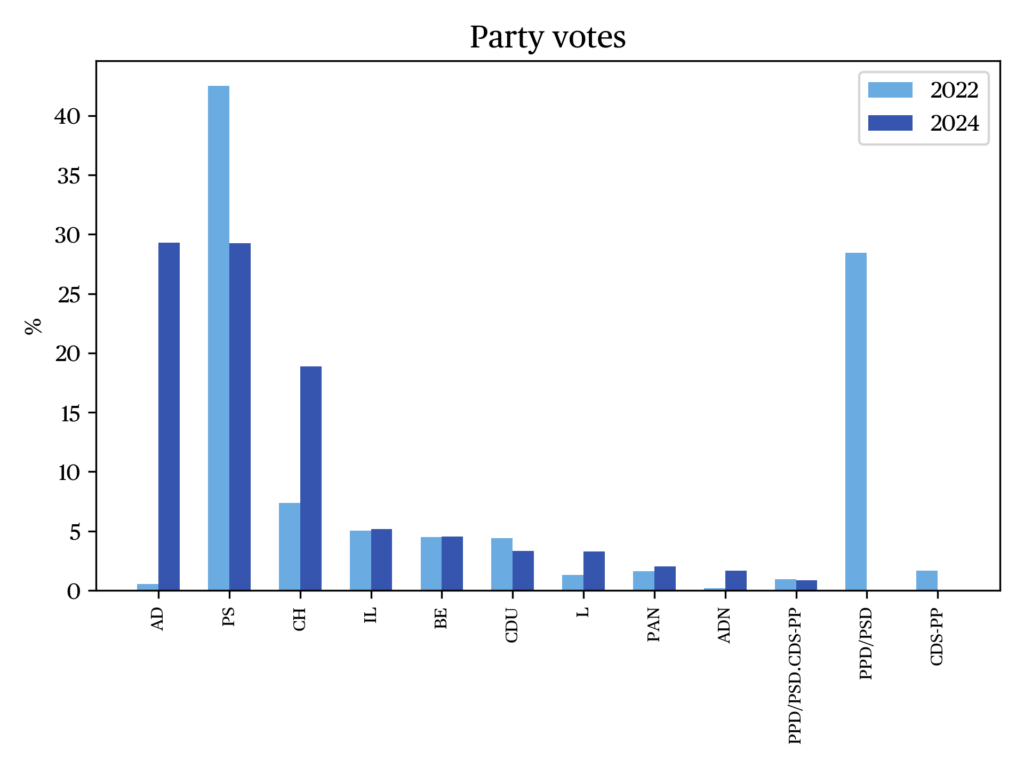
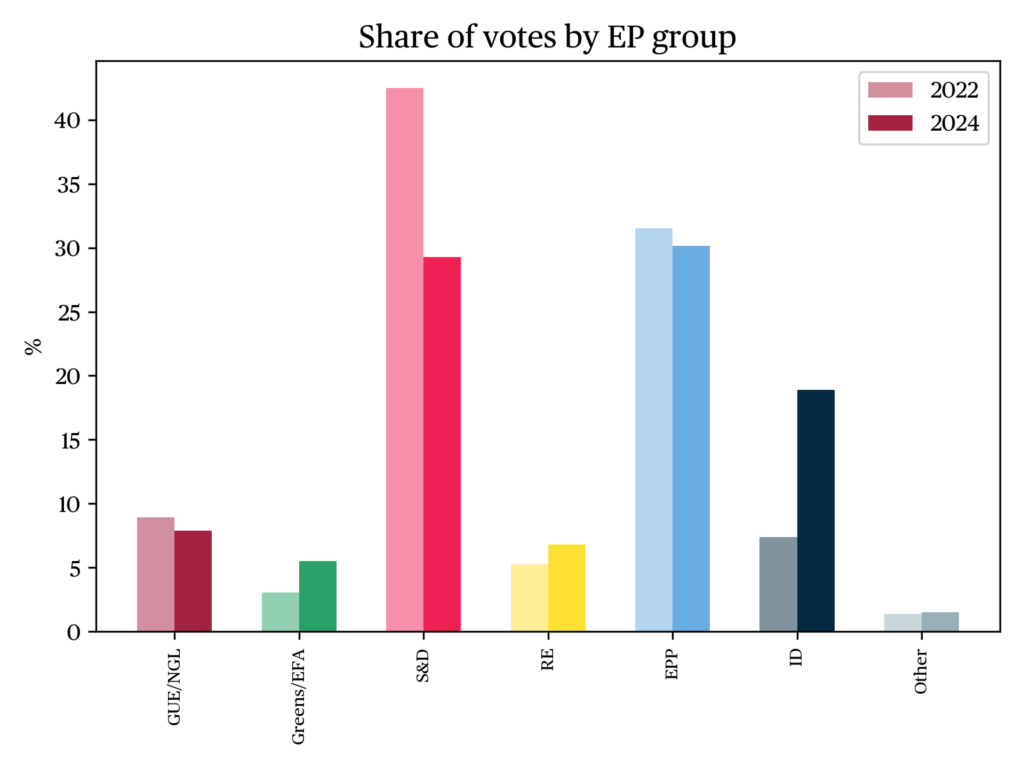
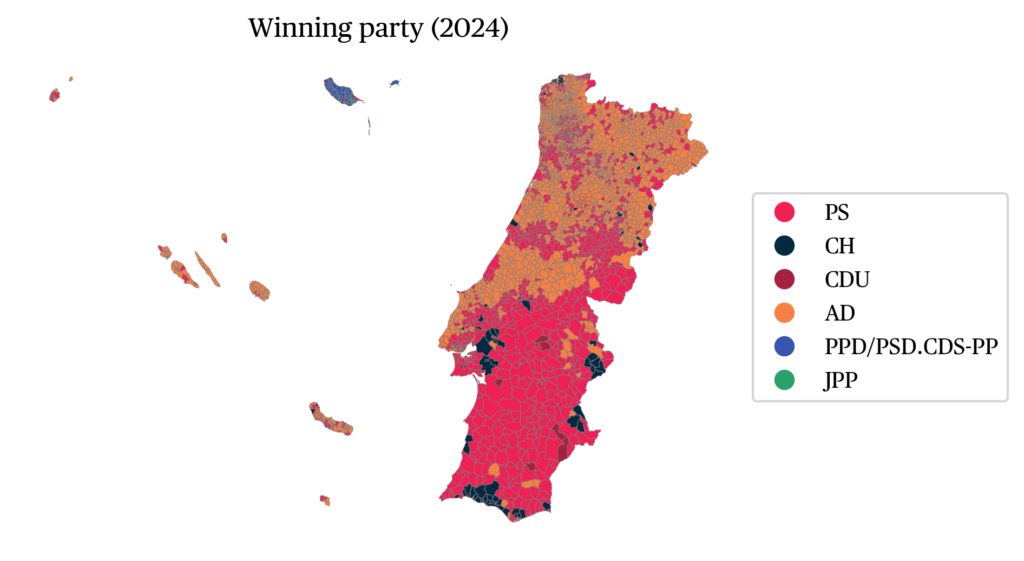
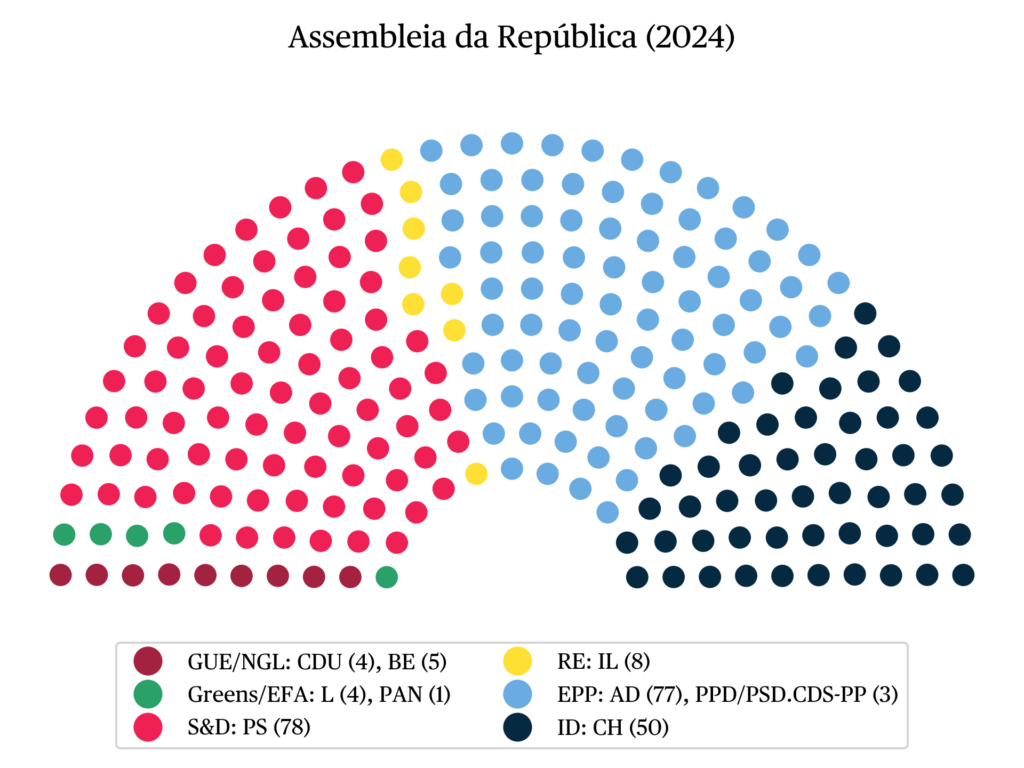
References
Lisi, M. (2022). Partidos em Tempos de Crise. Transformações dos sistemas partidários em Portugal e na Europa no século XXI. Lisbon: Edições Sílabo.
Lisi, M., Rodrigues Sanches, E., & Jayane dos Santos, M. (2020). Party system renewal or business as usual? Continuity and change in post-bailout Portugal. South European Society and Politics 25(2), 179–203.
Costa Lobo, M. & Espírito-Santo, A. (2024). O eleitorado português no século XXI. Lisbon: Tinta da China.
Ferrinho Lopes, H. (2024). Radical right advance and party system change: the 2024 Portuguese snap elections. West European Politics, 1–18.
Santana-Pereira, J. & De Giorgi, E. “Your luck is our luck”: Covid-19, the radical right and low polarisation in the 2022 Portuguese elections. South European Society and Politics 27(2), 305–27.
citer l'article
Marco Lisi, Parliamentary election in Portugal, 10 March 2024, Sep 2025,
à lire dans cette issue
voir toute la revue





